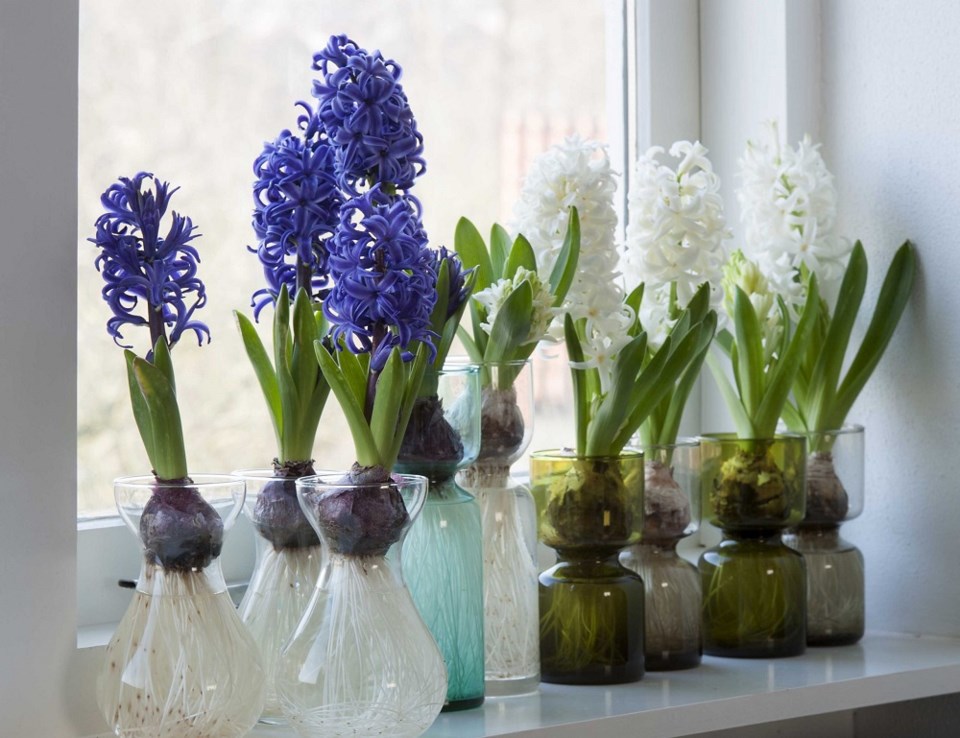Forcing bulbs into bloom this time of year is an age-old tradition that has an increasing following today!
Specially prepared, heat-treated bulbs, like Paperwhite narcissus, are traditionally used at this time of year to dress our homes for the coming holidays.
They also make wonderful gifts for anyone needing a bit of cheer. Whether they are potted in soil or set on stones in glass containers (so their white roots are displayed), the secret to creating their optimal performance is to start them cool. They need at least ten days of outside temperatures in the 5°C to 10°C range for the roots to begin developing. Once the roots are nicely established, the green leaves will begin to grow. By keeping the bulbs cool, nice, compact flower stems will emerge at the same time. Once the flower stems are out of the bulbs, bring them inside to watch the flowers develop. The cooler you keep them (around 10°C), the more compact and attractive the whole plant will look. Once the flowers open, you get to enjoy their unique perfume.
Prepared hyacinths are much the same, only more compact and with a much more powerful fragrance. For lasting beauty, they, too, should be kept cool. The hottest look in the Netherlands right now is waxed and painted bulbs.
Hyacinth bulbs are dipped in a coloured wax solution, which adheres to the bulbs without harming them. By adding value in this way, it makes a surprising difference. Unfortunately, this process is not yet available in our part of the world.
Although they don’t have any scent, large, stunning amaryllis flowers are very much part of our indoor winter colour. A few years ago, when I was in Germany visiting a large bulb company, I was told that, in Europe, amaryllis are overtaking poinsettias in popularity. At this time of year, pre-started, in-bud and ready-to-bloom potted amaryllis are widely available. Many folks, however, prefer to buy and start the bulbs themselves. Bulbs come in many sizes and varieties, and my suggestion is always to purchase the biggest bulbs possible for the greatest number of flower stems and for the largest flowers.
Amaryllis bulbs should be potted so the top one-third of the bulb is showing above the soil. This creates a unique, characterful look. Started amaryllis bulbs should be kept beside a cool window so they can develop slowly.
Waxed and painted amaryllis bulbs are very much part of the forcing bulbs trend. Everything needed to bloom is contained inside the bulbs, and they will produce beautiful flowers without producing roots. They are a wonderfully creative gift idea that is really catching on.
Now is a perfect time to pot up bulbs for indoor enjoyment early in the new year, not only for our own pleasure, but also as great gifts for friends and family to appreciate once all the bright lights and vibrancy of the Christmas season have passed.
When dealing with non-prepared bulbs, there are always a few considerations. Not all bulbs are suitable for early forcing, so, it’s important to choose the best candidates.
Tete-a-tete daffodils, hyacinths and crocuses are some of the easiest and best options for this process. I like to choose smaller pots in the four-to-six-inch range for the best results, and because so many of our packaged soils are very light weight, I add about 25 per cent sand into the mix. Normally bulbs are pushed deep into the soil and then covered with sand to prevent them lifting themselves out of the pot.
Europeans are now taking an entirely new approach. Instead of burying the bulbs, they place them on top of the soil so the bulbs themselves become part of the beauty. They are also using more decorative natural-looking pots or ones made from wicker or twigs. Covering the soil of these top-planted bulbs with a little sand will keep them stable.
Once the bulbs are planted, they need a four-to-six-week cooling period for the roots to develop and to allow the flower stems to push out of the bulbs. A cool, above-freezing location is important during this period.
Placing the bulbs outside in a western or southern spot, out of the coldest winter winds, and covering them with sawdust or bark mulch will protect them from freezing, while allowing the roots to grow.
Depending on the variety of the bulb, once they are rooted in and are showing stem growth, they are ready to bring indoors to bloom. Usually the crocuses emerge first, followed by hyacinths and then Tete-a-tete daffodils. There are a number of minor bulbs, like grape hyacinths (muscari) and scillas, which will also work well.
Being able to enjoy spring flowers on a windowsill in January is a real spirit lifter.
Because of the rather wet fall, many garden stores still have a good selection of bulbs that are ideal for forcing. They can be started right away, and they make inexpensive gifts that many folks would really appreciate.
Just remember: keep them cool for the best results.



